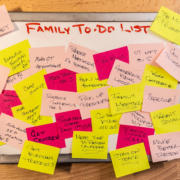It’s Our Space and Your Mess (Part 2, Video)
How much clutter is acceptable can be a hot-button issue for anyone sharing a living space, especially if you are not on the same page about how the space will be kept and who will be doing what. It’s an issue that’s been dividing people for as long as there’s been space to share.
In this video, we build on Part 1 to discuss practical strategies that you can use, right now, to start having more constructive conversations about this seemingly small, but potentially hugely important subject.
Feig Mediation Group helps parents, families and businesses create paths to more positive outcomes when important issues and decisions are on the line and communication can be most difficult. We have a particular focus on working with parents in neurodiverse families and issues involving adult families and aging loved ones.
If you wish to learn more about our practice, are considering mediation, or are interested in scheduling a free consultation, you can contact us at: erik@feigmediationgroup.com or https://www.feigmediationgroup.com
Video Transcript:
In part one of this two-part series, we talked a bit about why and how conversations about clutter in our shared spaces can get combative very quickly.
How, instead of attacking the problem, these discussions can quickly become about attacking each other for what’s going on, in effect, hurting your relationship and not solving the problems you wanted to address.
So in this video, we’ll talk about four ideas that can help you and your partner start solving this messy situation in ways that will keep you focused and on the same team, so that you can support each other in doing something about it.
Hi, I’m Erik Feig, mediator and founder of Feig Mediation Group in Bethesda, Maryland.
In the last video, I spoke about focusing first on the goal.
Is it to vent at each other or is it to resolve the issue? The venting might feel good in the moment, but if you’re looking to work together, it’s probably not the most productive way to get things going.
So here’s your first tip, before you start an important conversation with anyone else about this, plan your part.
Winging it and hoping for the best is not a strategy for success. Now, I’m not saying you need to create a script. What I am saying is be clear with yourself first about what you’re hoping to accomplish. Write it down. See if you could say it in one sentence, two tops.
If you’re not being clear with yourself about where you want to go, it’s going to be that much harder to communicate effectively with anyone else.
Whatever your living arrangement, whether it’s a marriage, a family, a roommate situation, start with being clear on your purpose.
And that leads us to our second tip, ask to have the conversation and then schedule it. Don’t just dive in.
If the issue is important, you both deserve to be at your best when you talk about it. And that means finding time when you’re not distracted, when you’re not rushed. And when you’re in a frame of mind where you’re able to focus.
Third tip, when you make your ask, do it in a way that focuses on your needs instead of attacking the other person. Instead of leading with your exasperation and playing the blame game, use “I” statements.
Be thoughtful about how a cluttered space makes you feel before you speak with them.
Consider how you can reassure them that you are not judging them, but you’re trying to address an issue.
“I want to set a time when we can both talk about how we can make the space work better for us. This is something important to me.
Since we both share the space, I feel strongly that this be something we work on together. I’m hoping we can work as a team on this and I want to do it at a time when we can both focus, are you open to this? Can we put something on the calendar?”
Set boundaries for the conversation if you need to, for instance, if you get a defensive response, that is, they’re getting ready to respond to what they expect will be an incoming attack from you, be clear that you don’t want this to be a battle. Reassure them you’re going to do your part to keep that from happening and to stay on track.
“I want to make sure I’m clear, I’m going to do what I can to keep myself focused on the issue.
My hope is that this doesn’t turn into us arguing about who did what, and when, and I’m going to do my best to make that happen, is that okay?”
Yes, this may sound stilted, it may sound scripted, but when you take the time to think about how you ask and approach sensitive issues respectfully, it can make a big difference. Make the script your own.
Fourth tip, when you have the conversation, agree on what you’ll talk about specifically. What’s your agenda going to be? If you make the conversation too big, it’s a setup to get lost.
Make the issues themselves concrete and make the solutions concrete. Look at what’s possible, look at what’s realistic and keep in mind the moral about eating an elephant one bite at a time.
So, look together at what steps and what resources you might need to make things happen. Brainstorm all of this together before you make decisions. Coming up with ideas together can lead to solutions you might not have thought about alone. Then, you’ve set the stage to start making the plan work together to make it all happen.
These conversations can be tricky, by focusing on the setup, creating some structure, and then working together, you can increase your chances that the conversation will be constructive.
Keep in mind, changing patterns takes time. Sometimes you might need support to make it all work, especially if you have a history or when emotions might run high.
Having a mediator who can provide the structure and the bumpers to have conversations like this sometimes, may be what you need to get and keep things on track.
As a mediator, I’m neutral, I don’t have a stake in the outcome. I focus on providing you a process and helping you not only to hear each other but to focus on what’s next. It’s your situation, they are your solutions.
So if you’re looking for help changing the way these types of difficult conversations go for you and your partner, or if you’re interested in learning more about ways that mediation can help you when you get stuck, visit us or set up a free consultation at our website at www.feigmediationgroup.com.
I’m Erik Feig, thanks for joining me.









 Feig Mediation Group, LLC
Feig Mediation Group, LLC 

